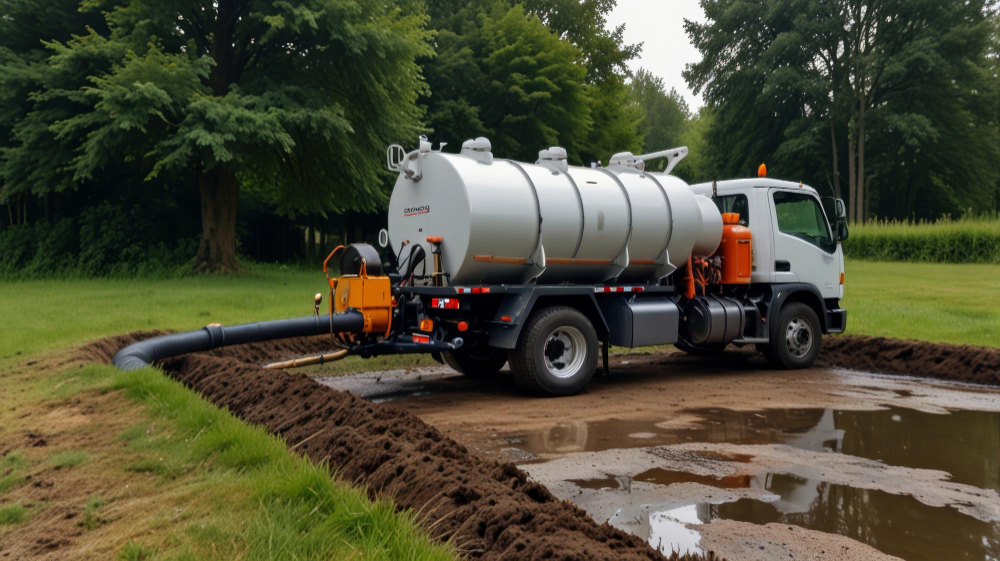Industrial facility septic pumping is crucial for maintaining a well-functioning septic system and ensuring compliance with Leesburg, VA regulations.
Regular septic pumping helps prevent costly repairs, environmental contamination, and legal issues.

As a business owner or facility manager in Leesburg, it’s essential to understand the unique septic needs of industrial properties and implement best practices for septic maintenance.
Optimal Septic Pumping Frequency for Industrial Facilities in Leesburg
Determining the right septic pumping frequency is key for industrial facilities in Leesburg. Several factors impact how often your septic tank should be pumped:
- Size of the septic tank
- Number of employees using the facility
- Volume and type of waste generated
- Age and condition of the septic system
Larger industrial facilities with more employees and higher waste volumes will require more frequent pumping compared to smaller operations.
A general rule of thumb is to schedule septic pumping every 2-5 years, but this can vary based on your facility’s unique circumstances.
| Facility Size | Number of Employees | Recommended Pumping Frequency |
|---|---|---|
| Small | 1-10 | Every 3-5 years |
| Medium | 11-50 | Every 2-4 years |
| Large | 50+ | Every 1-3 years |
Regularly assessing your septic system’s performance and waste levels can help you fine-tune your pumping frequency. Keep detailed records of septic maintenance and monitor any changes in your facility’s waste output to catch potential issues early.
Understanding Leesburg’s Environmental Regulations for Industrial Septic Systems
Leesburg has specific environmental regulations that govern industrial septic systems to protect public health and prevent pollution.
As an industrial facility owner, it’s critical to familiarize yourself with these regulations and ensure your septic system is compliant.
Some key regulations to be aware of include:
- Proper waste disposal requirements
- Regular septic system inspections
- Mandatory septic pumping and maintenance schedules
- Restrictions on the types of waste that can enter the septic system
- Reporting and record-keeping obligations
Failing to adhere to these regulations can result in hefty fines, legal action, and reputational damage.
By staying informed and proactively maintaining your septic system, you can avoid costly penalties and demonstrate your commitment to environmental stewardship.
| Violation | Potential Penalty |
|---|---|
| Improper waste disposal | $500-$5,000 fine per incident |
| Failing to conduct inspections | $250-$1,000 fine and/or corrective action |
| Non-compliance with pumping schedule | $500-$2,500 fine and system evaluation |
Regularly communicating with your septic service provider and local environmental authorities can help you stay current on any changes to regulations.
Consider appointing a dedicated staff member to oversee septic compliance and coordinate with relevant parties.
The Cost-Effectiveness of Regular Septic Pumping for Large Facilities
While regular septic pumping may seem like an added expense, it’s a cost-effective investment in the long run.
Neglecting septic maintenance can lead to costly repairs, system replacements, and operational disruptions that far exceed the price of routine pumping.
Consider the potential costs of a septic emergency:
- Emergency septic pumping and repairs
- System replacement due to irreparable damage
- Business downtime and lost productivity
- Environmental cleanup and remediation
- Legal fees and regulatory penalties
| Service | Average Cost |
|---|---|
| Routine pumping | $300-$600 every 2-5 years |
| Emergency pumping | $500-$1,000 per incident |
| System repair | $1,500-$5,000 or more |
| System replacement | $10,000-$30,000 or more |
In contrast, routine septic pumping is a predictable and manageable expense that can be budgeted for in advance.
Many septic service providers offer maintenance plans and discounts for regular clients, helping you save money in the long term.
Ensuring Environmental Compliance Through Septic Maintenance
Proper septic maintenance is not only crucial for cost savings and operational efficiency but also for protecting the environment.
A malfunctioning septic system can have severe ecological consequences, including:
- Contamination of groundwater and nearby water sources
- Soil pollution and damage to local ecosystems
- Release of harmful pathogens and bacteria
- Noxious odors and air quality issues
Regular septic pumping and inspections can catch minor issues before they escalate into major environmental hazards.
By removing built-up sludge and waste, pumping helps maintain the delicate balance within the septic system, preventing overflows and leaks that can harm the surrounding environment.
Adhering to Leesburg’s septic regulations and prioritizing routine maintenance demonstrates your facility’s commitment to environmental stewardship.
This can help build trust with local authorities, customers, and the community, enhancing your reputation as a responsible corporate citizen.

Why Regular Industrial Facility Septic Pumping Matters for Leesburg Businesses
As an industrial facility owner in Leesburg, VA, prioritizing septic maintenance is essential for:
- Regulatory compliance and avoiding penalties
- Cost savings through preventive maintenance
- Smooth and uninterrupted business operations
- Environmental protection and stewardship
- Positive community relations and reputation
By understanding your facility’s unique septic needs, staying current on local regulations, and working closely with a trusted septic service provider, you can ensure a well-functioning, compliant septic system.
Regular septic pumping is a critical component of this proactive approach, helping you avoid costly emergencies and contribute to a cleaner, healthier environment in Leesburg.
FAQs
What is the optimal frequency for industrial septic pumping in Leesburg, VA?
The optimal frequency for industrial septic pumping in Leesburg depends on factors such as tank size, number of employees, and waste volume. Generally, pumping every 2-5 years is recommended, but larger facilities may require more frequent service.
How can I ensure my industrial facility meets septic pumping regulations in Leesburg?
To ensure compliance with Leesburg septic regulations, familiarize yourself with local requirements, maintain detailed records of septic maintenance, and work closely with a licensed septic professional who understands the specific needs of industrial facilities.
Why is regular septic pumping important for large facilities in Leesburg?
Regular septic pumping is crucial for large facilities in Leesburg to prevent system malfunctions, avoid costly repairs and downtime, maintain regulatory compliance, and protect the local environment from contamination.
What are the costs associated with industrial facility septic pumping in Leesburg?
The cost of industrial facility septic pumping in Leesburg varies based on tank size and pumping frequency but typically ranges from $300 to $600 every 2-5 years. This preventive expense is much lower than the potential costs of emergency repairs or system replacement.
How does proper septic maintenance contribute to environmental compliance for industrial facilities?
Proper septic maintenance, including regular pumping, helps prevent environmental hazards such as groundwater contamination, soil pollution, and the release of harmful pathogens. By prioritizing septic care, industrial facilities demonstrate their commitment to environmental compliance and stewardship.


